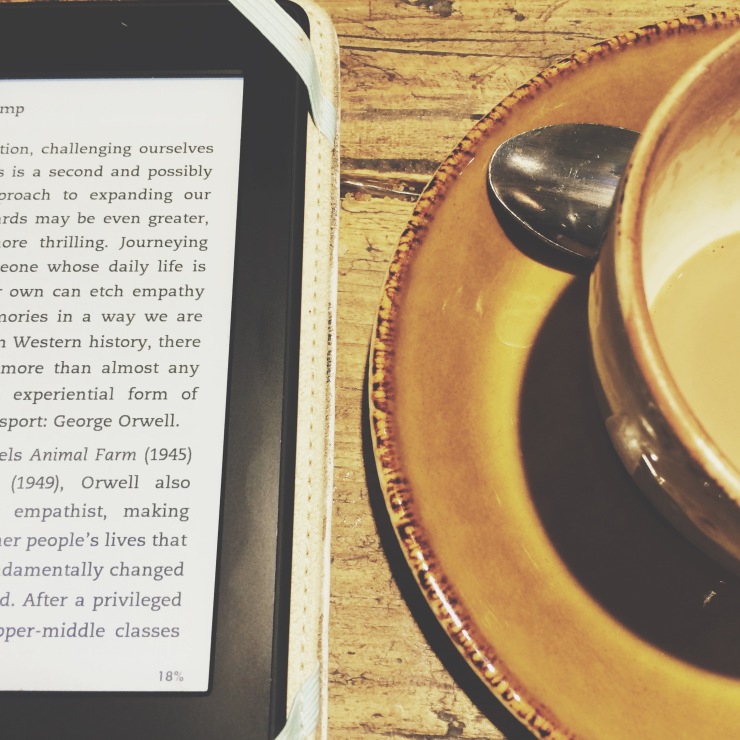The Wonderbox: Curious Histories of How to Live by Roman Krznaric is an intriguing look into the history of living by the founder of the Empathy Library and the Empathy Museum. I am drawn towards books about the philosophy and psychology of living – I find it interesting thinking about how we live our lives, how it is possible to change the way you think and live, and I take inspiration from different ways of seeing the world. Psychology and Sociology interest me in terms of how cognition and society affect the way we live and think.
 I realise that sometimes people are reluctant to read so-called ‘self help’ but there are many good books nestled within the genre. In recent years, I have found books about introversion, psychology and straightforward ‘living projects’ that have captured my interest and have given me new insights, such as Introvert Power by Laurie Helgoe and The Happiness Project by Gretchen Rubin.
I realise that sometimes people are reluctant to read so-called ‘self help’ but there are many good books nestled within the genre. In recent years, I have found books about introversion, psychology and straightforward ‘living projects’ that have captured my interest and have given me new insights, such as Introvert Power by Laurie Helgoe and The Happiness Project by Gretchen Rubin.
The Wonderbox is simply that – a treasure chest of ideas, ways of living and of thinking that have been drawn from history – from the Ancient Greeks to Industrial Britain. Rather than being a dry treatise of social history, this book offers different ways of thinking about subjects such as love, empathy, work, creativity, death, and travel. It offers insights on our relationship with nature, to how we can think about money differently.
‘Know thyself,’ advised Socrates. Following this requires more than gazing, like Narcissus, at our own reflections. We must balance introspective searching with a more ‘outrospective’ attitude to life. To discover ourselves, we must step outside ourselves and find out how other people think, live and look at the world. Empathy is one of our greatest hopes for doing so.’
I have to admit that I’m not a big reader of history, though I have received drips of history through various books. The Wonderbox is a book that brings the insights of history into the present, where we are often at a loss as to where to find inspiration for different ways to live our lives. We might find that we want to live in a simpler, less money-focused way, or that we want to think about death differently.
Or perhaps a relationship with nature is missing from our lives, and we don’t know how to relate to nature when we live in a city. Maybe we find that the dominant ways of thinking about creativity in our modern lives leaves us little room to define it for ourselves, and we want to know how we can make the time for more of it.
In particular, at this point in my life, everything in the book interested me. When you are going through a period where you are looking at your life and trying to find new ways to think about how you live and relate to the world around you, some books appear to fearlessly ask the questions and answer them in a way that helps you see what you do and don’t want for your own life.
‘Reducing the role of money in our lives, and shaking off our dependency on it, does not mean that we will be deprived of luxuries. The word ‘luxury’ comes from the Latin for ‘abundance’. We have been taught to think of it in material terms – fine wines, fast cars, first-class travel. But we can also have an abundance of intimate relationships, meaningful work, dedication to causes, uncontrollable laughter and quiet time to be with ourselves.’
Some things within the book opened up questions that I have been asking myself for some time, such as how to harness the power of empathy, and how to change your relationship with work, money, and creativity. The best thing about going back into history is that it gave me insights into how much our present opinions, social, and cultural landscape have been shaped by things that don’t give us what we need to grow, that don’t give us the space to flourish. I had many ‘eureka’ moments reading this book.
The takeaway from the book for me is that I don’t have to live in the way that society dictates. You don’t have to follow established patterns for how to live – there are ways to rethink our relationship with various things. It depends more on what you want from life – what your core values are and whether you want to grow and learn beyond them.
It makes life uncomfortable to step outside our preconceived ideas of what the world is like, or what life should be like, but rewarding on many levels. Don’t expect it to be easy to think about many of the issues this book covers – but stick with it and it will offer you important insights into how we can change our own lives and make the world a better place.
‘We might live our lives in a thousand different ways. And the civilisations of the past enable us to recognise that our habitual ways of loving, working, creating and dying are not the only options before us. We need only open the wonderbox of history and look inside to see new and surprising possibilities for the art of living. Let them spark our curiosity, captivate our imaginations and inspire our actions.’
Roman Krznaric has recently released a book – Empathy: A Handbook for Revolution – that expands on one of the most important sections of The Wonderbox. I already have this on my shelf and look forward to reading it.

interesting read!!
LikeLike
It certainly seems like an interesting read. I do like self improving books. Great review
LikeLike
I read a lot of self- help books- not that any have helped 🙂 Both of these sound good, I will add them to my list.
LikeLike
I loved this book too – and great to reacquaint oneself with interesting ideas of how to live better
LikeLiked by 1 person